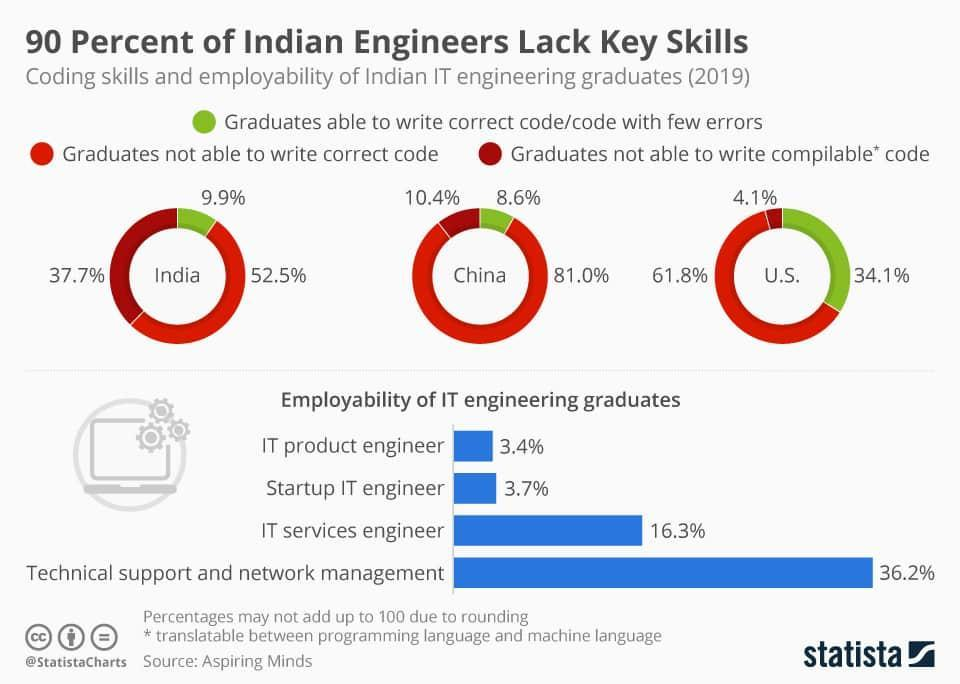Why are India's Graduates not Employable?
On April 18, 2022
According to the latest eighth edition of the Indian skills report, more than half of Indian graduates are unemployable in the current knowledge-driven economy. Another survey titled "National Employability Report Engineers Annual Report 2019" states that more than 90% of engineers do not possess enough programming and algorithm skills necessary to work in IT companies.
Reports state that, in 2021, 45.9% of graduates are employable, a decline of almost 1% from 2020 and 2% from 2019, which saw 47.38% employable graduates. If we talk about fields, MCA, polytechnic, and engineering are the primary areas where the employability rate is much lower than the students enrolling every year. In contrast to common belief, MBAs are most likely to have a higher employability rate of 46.59%, states the report.
Employability and unemployability of Indian graduates are a rising concern as the percentage of employed graduates is almost invisible compared to the employed ones. There are enough reasons stated why there's such a situation in the economy. Experts have opened multiple attributes that somehow contribute to the poor employability rate in India.
Education is the most powerful weapon, but what does one do if it does not provide you with enough employment opportunities to change the world?
Let's First Understand Unemployability
Unemployability essentially means if the jobs are available in the market yet, the company isn't ready to hire you because you do not possess enough skills to grab these opportunities and do justice to the role.

The growing number of educated youth who are unemployed has rapidly increased from 70 million in 2005 to 115 million in 2017-2018, reflecting one of the significant problems with the Indian education system. But what are the reasons behind unemployability in India? If not, then today, we'll give you enough reasons to think and understand why unemployment becomes a two-fold problem in India.
-
Living in a bubble
The harsh reality of Indians is that many of them still live in a bubble of dreams where they believe that getting into a college opens doors for innumerable high-paid jobs. Engineering was once treated like royalty, whereas today, only 3.84% of engineering graduates have the technical linguistic and cognitive skills required to get into any software-related organization or establish a startup.
Apart from hard skills, skills like communication, problem-solving, team spirit and adaptability are essential and play an inevitable role in the hiring process. Unfortunately, students fail to understand these parameters and rarely strive to achieve them.
-
Outdated curriculum
Another important aspect of why Indian graduates do not seal more employment is the outdated curriculum and reluctant college regulations. 10 out of 8 colleges are giving students attendance based on written assignments rather than employing knowledgeable faculty.
Colleges are not being able to move ahead with time and upgrade their outdated curriculum. Though the demand for skills like artificial intelligence, data science, and digital marketing is still growing, a maximum of 3% of graduates is familiar with these new-age technological skills.
The subjects that are taught in Indian college institutes are theoretical and do not contribute to even 1% in the growth and development of graduate students. At the same time, not more than 4% of graduates who do internships consider their college study to have played any part in their employment.
Some of the other reasons for unemployability in India are:
- Shortage of higher education institutions and knowledgeable faculty.
- Lack of flexibility in students as well as teachers.
- A higher rate of graduates as compared to available employment opportunities.
- Lack of soft skills such as communication, team spirit, problem-solving, self-motivation, and adaptation.
Ways to resolve this brimming problem

One of the major steps towards resolving the unemployability problem could be by establishing strategic partnerships and healthy collaborations between startups, enterprises, and institutions.
Another important step is that students need to burst the myth that one-time education will guarantee lifelong jobs. The degree is just a step towards a high-paid job; however, it's time to stop believing it is the only step towards it.
The introduction of the new policies in the agriculture sector and agro-based industries will help minimize seasonal unemployment.
Change in the educational pattern right from pre-schooling will help to transform the child's brain. Therefore, a historic step was taken by the Indian government as they replaced the 34-year-old national policy established in 1986 and framed the NEP with a goal: to transform India into a vibrant, knowledgeable society.
Most people, especially the graduates, are self-employed in India. They are either in framing, trading, cottage industries, or other small-scale industries. Therefore, these people should give more assistance and training to attain a higher level of competency.
Government should take responsible steps to increase the employment opportunities in the country that will further contribute to the country's GDP.
Government should opt for policies such as decentralization of the industrial sector that will help the underdeveloped area to encounter better opportunities.
The last and the foremost step is the control of the population. The growth of the population should be regularly checked in order to solve unemployment problems.

Final verdict
The growing number of educated youth and declining opportunities are surely a matter of concern for both government and people. Therefore, it's time that noticeable steps are taken to improve the existing conditions of the economy and introduce dozens of startups to keep the pace of technological advancements.
Dear readers, If you are a part of a university/college and want to start offering new-age programs to your students or digitally transform your classrooms, kindly mail us at campus.sales@upgrad.com.


